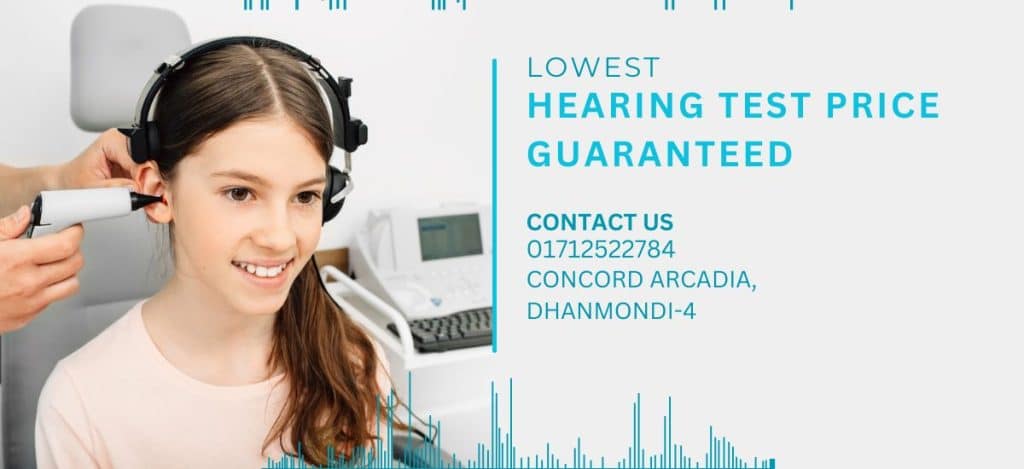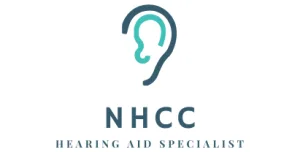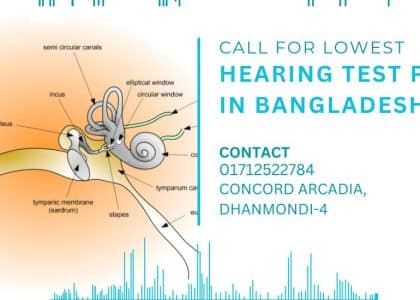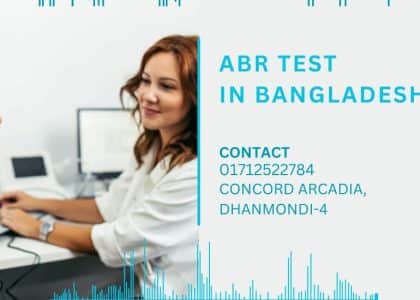Intro: PTA, Impedance, SRT Tests
Hearing is one of the most important senses, affecting communication, learning, and daily life. In Bangladesh, many people experience hearing problems that often go unnoticed, making early detection essential. Timely hearing tests allow for interventions, therapies, or hearing aids to prevent long-term complications.
PTA, Impedance, and SRT tests are commonly used to evaluate hearing. These quick and painless tests provide insights into how well a person hears different sounds, how the middle ear works, and how effectively speech is understood. Knowing the PTA, Impedance, and SRT test prices in Bangladesh helps individuals plan their hearing care and access quality services.
At National Hearing Care Centre, we offer accurate, patient-friendly assessments with advanced equipment and experienced audiologists. This guide explains these tests, their costs, preparation, and aftercare, helping you make informed decisions about your hearing health.
Index:
i. Intro: PTA, Impedance, SRT Tests
ii. PTA, Impedance, And SRT Tests Explained
iii. PTA, Impedance, SRT Test Prices In Bangladesh
iv. Factors That Influence Hearing Test Costs
v. Report Collection Timeline
vi. Why Hearing Test Is Essential
vii. Who Should Take These Tests?
viii. Preparation for PTA, Impedance, and SRT Tests
ix. Aftercare and Things to Know Post-Test
x. Why choose us
xi. Conclusion
xii. Frequently Asked Questions (FAQs)

WhatsApp: 01712522784, 01821669013 | Google Map: Dhanmondi-4 (Next to Lab Aid)
–
PTA, Impedance, And SRT Tests Explained
PTA (Pure Tone Audiometry)
Pure Tone Audiometry (PTA) is a common hearing test that measures a person’s ability to hear sounds at different frequencies and volumes to determine the type and severity of hearing loss. During the test, the patient wears headphones and indicates when they hear a series of tones, usually by pressing a button. PTA is suitable for children, adults, and the elderly, especially those who have difficulty hearing conversations or high-pitched sounds.
Impedance (Tympanometry)
Impedance testing, or Tympanometry, assesses the health and function of the middle ear by measuring how the eardrum responds to changes in air pressure. The test is quick, painless, and involves placing a small device in the ear canal. It is particularly useful for children with frequent ear infections and adults experiencing middle ear problems.
SRT (Speech Reception Threshold)
The Speech Reception Threshold (SRT) test evaluates a person’s ability to hear and understand speech by asking them to repeat words spoken at different volumes. Unlike PTA, which tests tones, SRT focuses on functional hearing and speech recognition. This test helps audiologists plan treatments or recommend hearing aids, especially for understanding speech in noisy environments.
Comparing The Three Tests
While all three tests assess hearing, each has a specific focus:
– PTA measures sensitivity to pure tones across different frequencies.
– Impedance/Tympanometry checks the middle ear’s health and function.
– SRT evaluates the ability to understand speech at various volumes.
Together, these tests provide a comprehensive picture of hearing health, allowing audiologists to diagnose issues accurately and recommend the best solutions.
| Test | What It Measures | Procedure | Who Should Take It |
| PTA | Hearing sensitivity to different tones | Headphones, press the button when the tone is heard | Children, adults, and the elderly with hearing difficulties |
| Impedance | Middle ear function | A small device in the ear canal measures the eardrum response | Children with frequent ear infections, adults with ear problems |
| SRT | Speech comprehension | Repeat words spoken at different volumes | Anyone with difficulty understanding speech |
These tests are safe, quick, and painless, making them suitable for all age groups and an essential part of any hearing assessment.
PTA, Impedance, SRT Test Prices In Bangladesh
The cost of hearing tests in Bangladesh can vary depending on the type of test, the clinic’s location, and the technology used. On average, PTA tests range from BDT 1,000 to BDT 2,500, Impedance (Tympanometry) tests from BDT 800 to BDT 2,000, and SRT tests from BDT 1,200 to BDT 3,000. Prices may differ between clinics due to differences in equipment quality, expertise of audiologists, and additional services included, such as consultation or follow-up care.
At National Hearing Care Centre, we offer transparent and competitive pricing for all three tests, ensuring patients receive accurate and reliable assessments. Our advanced equipment, skilled audiologists, and patient-friendly approach provide added value beyond just the test itself. By choosing a reputable center, patients can access quality services without hidden costs, ensuring both comfort and accuracy.
Here’s a simple comparison table:
| Test | Price Range (BDT) | Notes |
| PTA | 1,000 – 2,500 | Measures hearing sensitivity at different frequencies |
| Impedance | 800 – 2,000 | Checks middle ear function and eardrum response |
| SRT | 1,200 – 3,000 | Evaluates speech comprehension at various volumes |
– Compare prices across clinics, but prioritize quality and reputation over the lowest cost.
– Ensure the clinic uses modern audiology equipment for accurate results.
– Look for centers that include consultation, report interpretation, and follow-up in their services.
By considering both price and quality, individuals in Bangladesh can make informed decisions while ensuring comprehensive hearing care.
Why Hearing Test Is Essential
– Detecting hearing issues early helps prevent complications such as speech delay in children, communication difficulties, or social isolation.
– Regular hearing tests assist in monitoring chronic conditions, tinnitus, or recurring ear infections, allowing timely intervention.
– Hearing assessments guide audiologists in deciding appropriate treatments, hearing aids, or therapy to improve overall hearing health.
– These tests are relevant for all age groups, including children, adults, and the elderly, ensuring long-term ear care and better quality of life.
– Early detection can improve academic performance and language development in children with hearing loss.
– Timely intervention can reduce frustration and stress caused by undiagnosed hearing difficulties.
– Hearing tests help identify age-related hearing loss, allowing seniors to maintain independence and social interaction.
– They are useful for people exposed to loud environments, such as construction workers, musicians, or factory employees, to prevent occupational hearing loss.
– Detecting hearing problems early can help prevent safety risks, such as not hearing alarms, signals, or warnings.
Factors That Influence Hearing Test Price
Type And Complexity Of The Test
The cost depends on the type and complexity of the hearing test. More comprehensive assessments, such as PTA combined with Impedance and SRT, are usually more expensive due to the detailed evaluation required.
Clinic Location And Reputation
Clinics in major cities like Dhaka may charge higher fees than those in smaller towns. Established and reputable clinics often have advanced equipment and provide more reliable results, which can increase the cost.
Audiologist Expertise And Experience
Highly trained and experienced audiologists can deliver more accurate test results. Their expertise ensures better interpretation of complex cases and professional guidance for treatment or hearing aids.
Additional Services Included
Some clinics include services like counseling, follow-up consultations, and hearing aid recommendations. These extra services can increase the overall cost but provide more value to the patient.
Equipment And Technology Used
The quality and modernity of the audiology equipment affect the test price. Clinics using advanced digital devices or newer diagnostic technologies may charge higher fees due to more precise and reliable results.
Test Duration And Staff Support
Longer or more detailed tests that require additional staff time can cost more. Extra assistance for children, the elderly, or patients with special needs may also increase the overall price.
Insurance Coverage Or Package Deals
Insurance may cover part or all of the hearing test cost for some patients. Clinics may also offer package deals for multiple tests or combined consultations, making testing more affordable.
Report Collection Timeline
– Test reports are usually ready within a few hours to a couple of days, depending on the clinic and test complexity.
– Reports can be collected in person, sent via email, or accessed through an online patient portal.
– Clinics often provide printed copies along with explanations from an audiologist for better understanding.
– Patients should consult the audiologist to clarify results, discuss treatment options, and plan follow-ups.
– Timely receipt of reports is important for early intervention, preventing further hearing deterioration, and ensuring appropriate care.
Who Should Take These Tests?
Children, adults, and the elderly:
Hearing tests are essential for all age groups to detect hearing issues early and maintain overall communication and quality of life.
Individuals with frequent ear infections or hearing concerns:
People who experience repeated ear infections, pain, or reduced hearing should undergo testing to identify underlying problems.
People exposed to high noise levels:
Professionals working in loud environments, musicians, factory workers, and construction workers are at higher risk of hearing damage and should have regular assessments.
Family history of hearing loss or genetic conditions:
Individuals with a family history of hearing impairment or inherited conditions should get tested early to monitor potential issues.
Children with speech or learning difficulties:
Hearing problems can affect language development and academic performance, making early testing crucial.
Adults noticing difficulty in conversations:
Those struggling to hear in noisy environments, follow phone calls, or understand speech clearly should get tested promptly.
Elderly experiencing age-related hearing loss:
Seniors often experience a gradual hearing decline, and testing helps maintain independence and social interaction.
People with tinnitus or ringing in the ears:
Persistent ringing or buzzing can indicate underlying hearing problems that need evaluation.
Patients with chronic illnesses affecting hearing:
Conditions like diabetes, hypertension, or ear-related diseases can impact hearing, warranting regular testing.
Anyone planning to use hearing aids or auditory devices:
Testing ensures proper diagnosis and selection of the most suitable hearing solution.
Preparation For PTA, Impedance, And SRT Tests
Pre-Test Guidelines:
Avoid exposure to loud noise for at least 24 hours before your hearing test. Make sure your ears are clean and bring your medical history, including medications and past ear issues.
What To Expect During Each Test:
During PTA, you will wear headphones and respond to different tones, while Impedance testing uses a small device in the ear canal. In the SRT test, you will repeat words spoken at different volumes, and all tests are painless and quick.
Tips For First-Time Patients:
Stay relaxed and follow the audiologist’s instructions carefully to ensure accurate results. Don’t hesitate to ask questions if you feel unsure about any part of the testing process.
Advice For Parents Bringing Children:
Explain the procedure to your child in simple terms to reduce anxiety. Keep them calm and allow extra time for younger children who may need guidance during the tests.
Clothing And Accessories:
Avoid wearing hats, headbands, or headphones that could interfere with the equipment. Comfortable clothing helps you stay relaxed throughout the tests.
Rest And Focus:
Ensure the patient is well-rested before the test, as fatigue can affect response accuracy. Being alert helps achieve the most reliable results.
Bring A Companion If Needed:
Children or elderly patients may benefit from having a parent or caregiver present for support. This can help them feel more comfortable during the test.
Follow Clinic-Specific Instructions:
Some clinics provide additional preparation guidelines to ensure precise results. Always follow these instructions carefully for the best outcome.
Preparation For PTA, Impedance, And SRT Tests
Pre-Test guidelines:
Avoid exposure to loud noise for at least 24 hours before your hearing test. Make sure your ears are clean and bring your medical history, including medications and past ear issues.
What To Expect During Each Test:
During PTA, you will wear headphones and respond to different tones, while Impedance testing uses a small device in the ear canal. In the SRT test, you will repeat words spoken at different volumes, and all tests are painless and quick.
Tips For First-Time Patients:
Stay relaxed and follow the audiologist’s instructions carefully to ensure accurate results. Don’t hesitate to ask questions if you feel unsure about any part of the testing process.
Advice For Parents Bringing Children:
Explain the procedure to your child in simple terms to reduce anxiety. Keep them calm and allow extra time for younger children who may need guidance during the tests.
Clothing And Accessories:
Avoid wearing hats, headbands, or headphones that could interfere with the equipment. Comfortable clothing helps you stay relaxed throughout the tests.
Rest And Focus:
Ensure the patient is well-rested before the test, as fatigue can affect response accuracy. Being alert helps achieve the most reliable results.
Bring A Companion If Needed:
Children or elderly patients may benefit from having a parent or caregiver present for support. This can help them feel more comfortable during the test.
Follow Clinic-Specific Instructions:
Some clinics provide additional preparation guidelines to ensure precise results. Always follow these instructions carefully for the best outcome.2
Why Choose Us
Expertise In PTA, Impedance, And SRT tests:
Our team of audiologists is highly trained and experienced in conducting all types of hearing assessments. They provide accurate, reliable results and personalized guidance for each patient.
Advanced, Patient-Friendly Equipment:
We use state-of-the-art audiology tools and technology to ensure precise testing. Our equipment is designed to be comfortable, safe, and suitable for all age groups, including children and the elderly.
Transparent Pricing And Value-Added Services:
At National Hearing Care Centre, we offer clear, competitive pricing with no hidden costs. Our services include consultation, report explanation, follow-up advice, and hearing care recommendations, providing complete value for patients.
Testimonials Or Success Stories:
Many patients have benefited from our comprehensive hearing assessments and personalized care. Their success stories highlight improved communication, better hearing health, and overall satisfaction with our services.
Friendly And Supportive Staff:
Our staff ensures a welcoming environment for all patients. They assist with scheduling, guidance, and answering any questions before, during, and after the tests.
Customized Hearing Solutions:
We provide recommendations tailored to each patient’s unique hearing needs. Whether it’s therapy, lifestyle advice, or hearing aids, our solutions focus on improving overall quality of life.
Commitment To Patient Education:
We educate patients and families about hearing health and preventive care. This empowers individuals to take proactive steps to maintain optimal hearing.
Contact Us
For any questions about PTA, Impedance, and SRT tests, or to schedule a hearing assessment, you can reach National Hearing Care Centre using the following methods:
WhatsApp for Inquiries: Message on WhatsApp
Email: info@nationalhearingbd.com
Address: House 1 & 2, 1st Floor, Room 247, Concord Arcadia, Dhaka 1205, Bangladesh
Website: nationalhearingbd.com
Google Maps Location: Click here to open
Business Hours:
Sunday 10 AM–8:30 PM
Monday 10 AM–8:30 PM
Tuesday 10 AM–8:30 PM
Wednesday 10 AM–8:30 PM
Thursday 10 AM–8:30 PM
Friday Closed
Saturday 10 AM–8 PM
Our friendly staff is available to provide detailed information about test procedures, pricing, preparation tips, and aftercare. Book your appointment today to take the first step toward better hearing health.
Conclusion
Regular hearing assessments using PTA, Impedance, and SRT tests are essential for detecting hearing issues early and preventing long-term complications. These tests provide valuable insights into how well a person hears, how the middle ear functions, and how effectively speech is understood.
At National Hearing Care Centre, we offer advanced, patient-friendly hearing tests with expert audiologists, transparent pricing, and comprehensive support. Early detection and proper care can improve communication, enhance quality of life, and ensure timely interventions such as therapy or hearing aids.
Taking a hearing test is a simple yet crucial step toward maintaining optimal hearing health for children, adults, and the elderly.

Frequently Asked Questions (FAQs)
Q: What is a PTA test?
PTA (Pure Tone Audiometry) measures your ability to hear different frequencies and volumes. It helps determine the type and severity of hearing loss.
Q: What is an Impedance or Tympanometry test?
Impedance testing evaluates the middle ear’s health and measures how the eardrum responds to air pressure changes. It helps detect fluid, infections, or eustachian tube problems.
Q: What is an SRT test?
The Speech Reception Threshold (SRT) test assesses your ability to hear and understand speech at different volumes. It is essential for evaluating functional hearing.
Q: Are these hearing tests painful?
No, PTA, Impedance, and SRT tests are completely painless. They are safe for all age groups.
Q: How long do the tests take?
Each test typically takes a few minutes, while all three tests together usually take 30–45 minutes.
Q: Who should get these hearing tests?
Children, adults, and elderly individuals should take these tests. People with frequent ear infections, exposure to loud noise, or a family history of hearing loss should also be tested.
Q: How much do these tests cost in Bangladesh?
Costs vary by clinic, equipment, and services. PTA, Impedance, and SRT tests generally range from BDT 800 to BDT 3,000.
Q: Do I need to prepare for the tests?
Avoid loud noise for at least 24 hours before testing, keep your ears clean, and bring your medical history to ensure accurate results.
Q: Can children take these tests?
Yes, these tests are safe for children and help detect early hearing issues that may affect speech and learning.
Q: Can elderly people take these tests?
Absolutely. Regular testing helps seniors detect age-related hearing loss and maintain social interaction.
Q: How are the test results delivered?
Reports can be collected in person, sent via email, or accessed through an online patient portal.
Q: How soon will I get my report?
Most clinics provide results within a few hours to a couple of days, depending on test complexity.
Q: Can hearing loss be treated after these tests?
Results help audiologists recommend treatments, hearing aids, or therapy to improve hearing.
Q: Are these tests safe for everyone?
Yes, the tests are non-invasive, painless, and safe for all age groups.
Q: How often should I take a hearing test?
Adults should test at least once every 2–3 years, while children and seniors may need more frequent assessments.
Q: Do insurance plans cover these tests?
Some insurance plans cover part or all of the hearing test cost. Patients should check with their provider.
Q: Can these tests detect tinnitus?
Yes, hearing tests can identify underlying causes of tinnitus and guide treatment options.
Q: Are follow-up consultations necessary?
Follow-ups help interpret results and recommend further treatment if needed.
Q: Can I take these tests if I have an ear infection?
It’s best to treat active ear infections before testing, as they may affect accuracy.
Q: Do I need to bring someone with me?
Children or elderly patients may benefit from having a parent or caregiver present. This can help provide comfort and support.
Q: Can these tests detect hidden hearing loss?
Comprehensive assessments, including PTA and SRT, can identify subtle or early-stage hearing issues.
Q: Are the results affected by loud environments?
To ensure accuracy, avoid exposure to loud noise 24 hours before testing.
Q: Can these tests help in choosing a hearing aid?
The results guide audiologists in selecting the most suitable hearing aid for each patient.
Q: Can I combine all three tests in one visit?
Most clinics, including National Hearing Care Centre, offer PTA, Impedance, and SRT tests in a single appointment.
Q: Are there any age limits for these tests?
These tests are suitable for all age groups, from infants to seniors.
Q: Can these tests monitor chronic ear conditions?
Regular testing helps track chronic conditions such as recurring infections or progressive hearing loss.
Q: How accurate are the results?
When performed by trained audiologists using advanced equipment, the tests provide highly accurate and reliable results.
Q: Is follow-up required after testing?
Follow-ups are recommended to review results, discuss treatment, or adjust hearing aids if necessary.Q: Why choose National Hearing Care Centre for these tests?
We offer expert audiologists, advanced patient-friendly equipment, transparent pricing, and comprehensive support to ensure the best hearing care for all patients.
–
–
Related Articles:
– PTA, Impedance, SRT Test Prices In Bangladesh
– Hearing Test Price In Bangladesh
– ABR Test Price In Bangladesh
– Hearing Care Center in Dhaka
– Audiologist In Dhaka, Bangladesh






